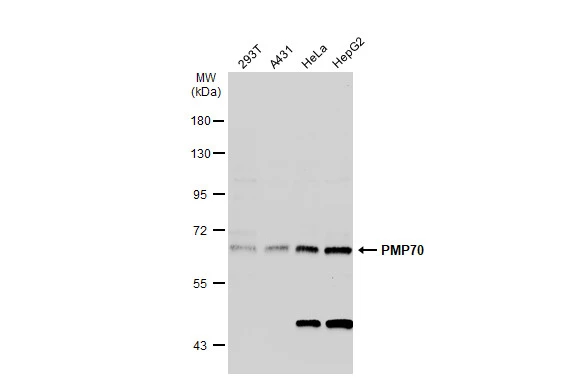anti-ABCD3 antibody
ARG64606
ApplicationsWestern Blot, ImmunoHistoChemistry, ImmunoHistoChemistry Paraffin
Product group Antibodies
ReactivityHuman, Mouse, Rat
TargetABCD3
Overview
- SupplierArigo Biolaboratories
- Product Nameanti-ABCD3 antibody
- Delivery Days Customer23
- ApplicationsWestern Blot, ImmunoHistoChemistry, ImmunoHistoChemistry Paraffin
- CertificationResearch Use Only
- ClonalityPolyclonal
- Concentration0.5 mg/ml
- ConjugateUnconjugated
- Gene ID5825
- Target nameABCD3
- Target descriptionATP binding cassette subfamily D member 3
- Target synonymsABC43, CBAS5, PMP70, PXMP1, ZWS2, ATP-binding cassette sub-family D member 3, 70 kDa peroxisomal membrane protein, ATP-binding cassette, sub-family D (ALD), member 3, Peroxisomal membrane protein-1 (70kD), dJ824O18.1 (ATP-binding cassette, sub-family D (ALD), member 3 (PMP70, PXMP1)), peroxisomal membrane protein 1 (70kD, Zellweger syndrome), peroxisomal membrane protein 70 kDa
- HostGoat
- IsotypeIgG
- Scientific DescriptionThe protein encoded by this gene is a member of the superfamily of ATP-binding cassette (ABC) transporters. ABC proteins transport various molecules across extra- and intra-cellular membranes. ABC genes are divided into seven distinct subfamilies (ABC1, MDR/TAP, MRP, ALD, OABP, GCN20, White). This protein is a member of the ALD subfamily, which is involved in peroxisomal import of fatty acids and/or fatty acyl-CoAs in the organelle. All known peroxisomal ABC transporters are half transporters which require a partner half transporter molecule to form a functional homodimeric or heterodimeric transporter. This peroxisomal membrane protein likely plays an important role in peroxisome biogenesis. Mutations have been associated with some forms of Zellweger syndrome, a heterogeneous group of peroxisome assembly disorders. Alternative splicing results in multiple transcript variants encoding distinct isoforms. [provided by RefSeq, Jul 2008]
- ReactivityHuman, Mouse, Rat
- Storage Instruction-20°C
- UNSPSC12352203






